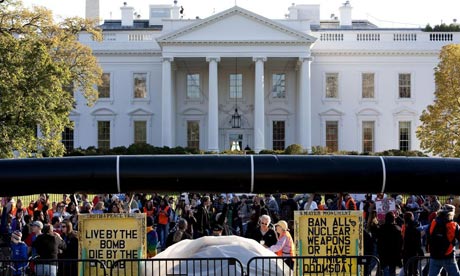I'm not sure how successful his event was because I was too busy being a graduate student, writing papers on rational choice theory and applying for fellowships, jobs and PhDs, but I read the next day about a rather dramatic campaign in Washington, DC, where thousands of protesters surrounded the White House shouldering a huge rubber replica of an oil pipeline.
 |
| Source: Reuters |
Keystone XL is a contentious issue in the US, and for good reason. The pipeline would bisect America, carrying oil from Canada's Athabasca oil sands in Alberta to refineries on the coast of Texas. It would cross the Ogalalla aquifer, a major source of fresh water for millions of Americans. The threat of oil spills is low, but credible, and with the Deepwater Horizon catastrophe still fresh on our minds, many Americans are unwilling to accept even the slightest chance of that happening. A number of prominent environmentalists, as well as a few congressmen, have called on Obama to block the Keystone XL Pipeline.
A question that a lot of people haven't asked, though, is "What happens if the White House does red-light the project?"
Thankfully, Canada's Minister for Natural Resources Joe Oliver has already answered this question for us. He's made it clear that if Obama doesn't approve the project, they'll just sell the oil to China. Instead of running vertically across the United States, the pipeline would run horizontally across Canada to shipping ports on the West Coast. From there, it would be pumped into tankers and shipped across the Pacific Ocean to refineries in China.
That's the last thing we want to happen.
The Chinese government's main priority is economic development, and as people get richer, their energy consumption is rising tremendously:
What China needs is to develop its renewable energy sector, and an economic incentive to do so. What China does NOT need is unfettered access to one of the world's dirtiest and largest oil reserves.
The Athabasca oil sands are going to be tapped, and there's nothing we can do to stop it. The question, then, is whether we want the Chinese government or the American government to be responsible for its safe transport to refineries. I prefer the latter. Sure, it's the lesser of two evils, but given our options, the choice should be clear.
That's the last thing we want to happen.
The Chinese government's main priority is economic development, and as people get richer, their energy consumption is rising tremendously:
 |
| Source: Chinese National Bureau of Statistics |
The Athabasca oil sands are going to be tapped, and there's nothing we can do to stop it. The question, then, is whether we want the Chinese government or the American government to be responsible for its safe transport to refineries. I prefer the latter. Sure, it's the lesser of two evils, but given our options, the choice should be clear.

No comments:
Post a Comment